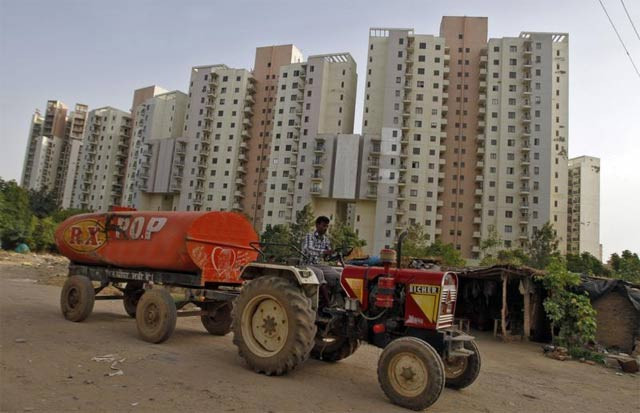One-time amnesty scheme proposed to calm jittery players in real estate sector
Govt had introduced amendment to increase revenue collection, move has created panic among stakeholders

Govt had introduced amendment to increase revenue collection, move has created panic among stakeholders. PHOTO: REUTERS
Naveed Zafar Ashfaq Jaffery & Co has sent its recommendations to the government on amendments introduced in Section 68 of the Income Tax Ordinance amid growing resentments among real estate investors.
The proposals, prepared by Ashfaq Tola who is a senior partner of the accountancy firm, were sent to the government a day after Finance Minister Ishaq Dar admitted that small and big investors alike were panicking after recent amendments in the property valuation laws.
Construction: Cement sales gain momentum in South zone
Dar, on Wednesday, held a meeting with senior FBR officials and directed them to call all the stakeholders early next week to find a solution to a problem that the government itself has created.
Till June 30, the value of the property for tax purposes was determined on the basis of deputy collector rates, which in most cases was several times lower than the prevailing market rate. For instance, the official collector rates in Defense Karachi is Rs1,650 per square yard while the FBR has unearthed transactions carried out at a whopping Rs155,000 per square yard rate.
Such a difference between the actual market rate and the collector rate resulted in parking of over Rs7 trillion in the real estate sector over a period of time, which the government is now trying to bring in the documented economy.
Through Finance Act 2016, the government got an amendment in section 68 of the Income Tax Ordinance approved. Now the fair market value of any property will be determined without taking into consideration the value fixed or notified by any provincial authority. It will be determined on the basis of valuation made by a panel of approved valuers of the State Bank of Pakistan.
Pitfalls
In his proposals, Asfhaq Tola noted that the change in the procedure for the valuation of immovable property may result in collusion between valuers and tax officials for financial incentives, which may result in loss of revenue to the exchequer. He said that there was also a possibility of collusion between valuers and taxpayers to understate the value of a property to reduce their capital gains tax liability. The valuation of different properties by different valuers may result in differing values resulting in difficulty of benchmarking as the process of valuation is judgmental, he added.
Real estate in Karachi to stay unaffected despite budget proposals
Tola said that the changed procedure might result in unnecessarily excessive litigations as the taxpayer as well as tax officials may disagree with valuations of each other’s appointed valuers due to no benchmarking.
“The most adverse impact will be flight of capital due to fear of levy of additional taxes and resultant default surcharge and penalties”, he added.
Solution
The firm has proposed three solutions to come out of this quagmire, importantly a tax amnesty scheme. It has suggested that a one-time amnesty scheme may be introduced to declare the property at actual cost and pay taxes at 2% or 3% on the amount of difference between declared cost and actual cost. Such differential amount may be added to declared assets after availing the scheme and payment of taxes. If the property is held for more than five years, no such taxes may be paid, said Tola.
According to his working, on a property that has a market value of Rs62 million but the collector value is only Rs7 million, the government may collect Rs1.1 million extra tax at 2% amnesty rate.
Govt misses deficit target, will need IMF’s lenient hand
The second proposed option is to charge a fixed tax at a rate of 3% to be paid at each time at the sale of property, which is to be charged on the amount of difference between collector value and market value.
The final option is that provinces must be convinced to revamp values in valuation table notified by the collector of the districts under section 27-A of the Stamp Act, 1899 at par with the current market values. In cases where the difference between values as per valuation tables and market value is substantial, the values may be gradually increased over a period of 2 to 3 years.
Tola argued that the 18th amendment in the Constitution has empowered the federal government again to make laws with respect to the capital gains on immovable property, which used to be provincial domain before 2010.
Published in The Express Tribune, July 14th, 2016.
Like Business on Facebook, follow @TribuneBiz on Twitter to stay informed and join in the conversation.


















COMMENTS
Comments are moderated and generally will be posted if they are on-topic and not abusive.
For more information, please see our Comments FAQ